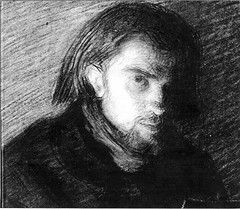Fertile Music
The Weekend Quote:
Truly fertile Music, the only kind that will move us, that we shall truly appreciate, will be a Music conducive to Dream, which banishes all reason and analysis. One must not wish first to understand and then to feel. Art does not tolerate Reason.-Albert Camus (1913-60)


5 Comments:
My only question to this: would Camus then believe J.S. Bach to be "infertile" music?? Bach's music confirms reason and analysis (perhaps the most prolifically)...and never banishes these. Is Bach not fertile/moving? Do works such as Magnificat or the b minor mass not inspire The Dream?
Camus' quote is really more a commentary and confirmation of Claude Debussy's writings on 'good art.' ...and this would not surprise me in the least, the high-fiving of two Frogs. (smile)
However! Is Camus saying that truly fertile music CAN be theoretically sound and yet live outside that world (banishing it) and in the Dream?
Dear Anon,
Thank you for your most provocative comment concerning the Camus quote. You bring up a wonderful point, and one that I’ve been turning over in my head. I believe that Bach’s music is most certainly moving and fertile, and the quote of Camus is truthful and accurate. Contradictory? Maybe.
Please consider a few points about Bach:
1. He held quite a disdain for the “wooden” contrapuntalists who rationally followed systems of composition.
2. Our rational understanding of his music, like the underpinning harmonies, beginning with Rameau’s Traité de l’harmonie (1722), has grown to a formulaic conception of Baroque methods. This understanding has come with the baggage that we often mistakenly ascribe to Bach’s music a prescribed pattern instead of viewing it as brilliantly crafted consistent aesthetic choices.
However, I still don’t find that I’ve satisfactorily defended my perspective because of our very ability to rationally explain the way Bach’s music is constructed. I have to defend with a counter question: does our understand of the method tell us about the real beauty of Bach’s finest works? Does it discern quality?
My position is possibly as much a reaction based on my own personal tastes and aversions as much as anything. I’ve encountered numerous colleagues who believe in the necessity of systems and rational processes and thoroughly reject music by spiritualists like Gubaidulina for example. I find their arguments unpersuasive because of my sensualist musical taste. Highly formalized music usually leaves me cold. There will be exceptions of course.
I like this topic even though I feel rather unconvincing in my argument here. I would enjoy more feedback from others. Putting it to the blog readers, what do you say?
Isn't beauty (or truth or goodness for that matter) made up of complexity in harmony? If it is, then we can always talk about (analyze) how the various complexities have been harmonized. Dreams and emotive states are not removed from the mind that makes sense of them. I imagine this is true both when one makes art and/or when one makes sense of art. Reason, beauty, emotion, dreams are not at odds, but always finding some kind of balance in good art.
… a quick opinion from a theo/philosopher.
Peace,
Dan
Dear Dan,
You’ve brought up a wonderful point about complexities relating in harmony. That’s exactly how I like to think of Mozart. You’ve brought the debate out of the “either/or” discussion, which was needed. I think that what you say is a good theory of beauty but I wonder if it encompasses the sublime as well?
Here I’m thinking of information theory. Artistic dialogues can include intentional muddling of the equilibrium that you describe. That’s been a big part of contemporary artistic notions. I’m thinking of contortions, imbalances, novel combinations, and asymmetries causing something different than simple beauty. I look forward to exploring this further.
As for the issue of fantasy, it is a matter of personal emphasis to me. I believe that the gift of fantasy is the most crucial to art. The rational is the tool.
A question for the Theo/Philosopher: Is there some type of Kierkegaard style leap of faith that happens in art as well? (I know that I’m taking this idea way out of context.)
“Artistic dialogues can include intentional muddling of the equilibrium that you describe. That’s been a big part of contemporary artistic notions. I’m thinking of contortions, imbalances, novel combinations, and asymmetries causing something different than simple beauty.”
Harmony needs complexity or intensity to draw it forward preventing stasis – stretching notions of truth, beauty and goodness. Complexity or intensity needs harmony to prevent chaos – to help us to bring things (often disparate, novel, and asymmetric things) into some kind of harmonization (however strong or weak we may see this harmonization from our aesthetic vantage point). Much of my favorite art stretches harmony toward intensity and complexity as the art you describe.
I’m not sure where you’re headed with Kierkegaard. You’ll have to say more.
Peace,
Dan
Post a Comment
<< Home